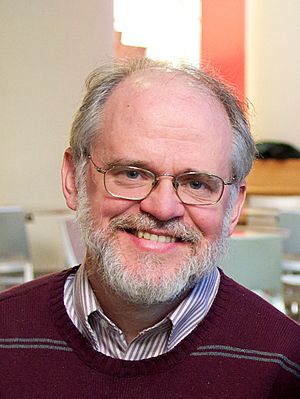Mark Baker (linguist) facts for kids
Quick facts for kids
Mark Baker
|
|
|---|---|
 |
|
| Born | 1959 (age 66–67) |
| Alma mater | MIT |
| Scientific career | |
| Fields |
|
| Institutions | |
| Doctoral advisor | Noam Chomsky |
Mark Cleland Baker, born in 1959, is an American linguist. A linguist is a scientist who studies human language. He earned his Ph.D. (a high-level university degree) from MIT in 1985. Since 1998, he has been a professor at Rutgers University.
Contents
What Does a Linguist Do?
A linguist like Mark Baker explores how languages work. They study everything from how sounds are made to how sentences are put together. They also look at how languages change over time.
Studying Language Structure
Mark Baker's work focuses on something called generative grammar. This is a way of thinking about how our brains create sentences. It suggests that humans have an inborn ability to learn language. He studies the rules that allow us to form endless new sentences.
Mark Baker's Work with Languages
Mark Baker has spent many years working with the Mohawk language. This language is spoken by the Mohawk people in North America. He helped them with efforts to keep their language alive. This is called language revitalization.
Polysynthetic Languages
He is well-known for his studies of polysynthetic languages. These languages are very interesting because they can pack a lot of meaning into one word. Imagine a single word that means a whole sentence in English! Mark Baker has written several books explaining how these complex languages are built.
His Career and Teaching
Before joining Rutgers University, Mark Baker taught at McGill University from 1986 to 1998. He has also often been a teacher at the Summer Institute for the Linguistic Society of America. This is a special program where linguists from all over the world come together to learn and share ideas.
See also
 In Spanish: Mark Baker (lingüista) para niños
In Spanish: Mark Baker (lingüista) para niños

